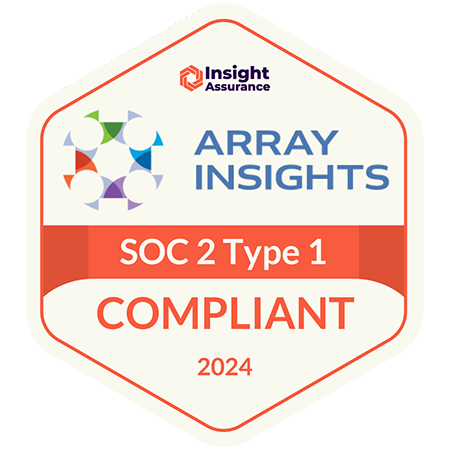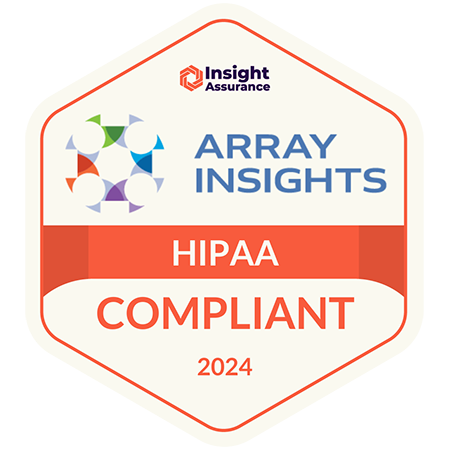Case Study: The Kidney Cancer Association Builds a Next-Gen Clinical Data Federation

Despite significant advances in the past few decades, many kidney cancer treatments aren’t effective for patients. These patients are counting on research breakthroughs to ensure longer, better lives.
How can a next-generation patient advocacy group enable much-needed breakthroughs? The Kidney Cancer Association (KCA) is providing an example, with the help of Array Insights.
Partnership Goal
The end goal of the partnership is clear: fuel unprecedented breakthroughs in kidney cancer treatment and care that will make a meaningful difference to patients and their families.
The Bottom Line
The KCA and Array Insights created a clinical data federation, The KCA Data Federation, to eliminate patient data silos and supercharge breakthroughs for rare kidney cancer types.
The KCA Data Federation is helping to transform a high volume of rich, valuable kidney cancer data into a comprehensive database that researchers can easily access via patient-centric data practices. The federation includes clinical data sets from multiple hospitals across the country, with an expected expansion on the way.
Array Insights is providing a data federation platform and data security technologies for the KCA Data Federation.
3 Challenges: The KCA’s Patient Data Hurdles
When it comes to research, data is power. However, the impact of clinical data is determined by the medical community’s ability to easily and securely access its insights.
For KCA, there are three key obstacles that prevent access to data sets from hospitals and other institutions:
1 Kidney cancer data has historically been siloed.
The good news: a large volume of kidney cancer data already exists thanks to decades of clinical trials, sizeable patient databases and medical record keeping during routine treatment and care.
The bad news: traditionally, there had not been a comprehensive database dedicated to kidney cancer that was accessible to researchers, scientists and other clinical research stakeholders. The research that the KCA supported was siloed at institutions or between 2-3 collaborative institutions.
2 Data practices must remain patient-centric.
Before the KCA could increase access to kidney cancer data, they first needed a solution that took a patient-centric approach to privacy and withstood the rigorous standards of hospitals and other healthcare institutions.
3 Researchers face a limited data pool for rare subtypes.
Only about 25-40% of kidney cancer patients respond to treatment options. Toxic side effects mean patients may not tolerate treatment for long. There’s a growing need for clinical insights and huge potential to improve care options.
Beyond that, 75% of kidney cancer patients have clear cell renal cell carcinoma (RCC). The remaining 25% have a rare subtype with a drastically reduced number of treatment options. To unlock more clinical breakthroughs, KCA leaders needed to fuel more research and collaboration around these conditions, which are often neglected in research and clinical trials.
3 Solutions: The KCA & Array Insights Strategy
Here’s how the KCA and Array Insights are accelerating research goals with technology that puts patient privacy first:
1 Offer hospitals a digital rights management platform.
The KCA Data Federation offers hospitals a digital rights management platform to maintain full ownership and control of their data — unlike traditional data registries.
Using the federation, researchers’ queries move to contained patient datasets and only the insights or results are sent back to the researcher. Data can’t be copied and pasted, emailed, forwarded, downloaded or end up on unauthorized servers This means there are fewer obstacles for participating hospitals and institutions with strict data access standards.
2 Deploy a privacy-preserving data methodology.
The federation uses a pioneering form of patient-centric AI technology — machine learning and analytics on federated data — to ensure that patient data stays contained, and that all data uses are loggable and auditable by the KCA and their hospital and institutional partners. The federation leaves no room for human error.
This is a stark contrast to data brokers and profiteers, who often sell de-identified patient data – which can often be easily re-identified — to third parties for profit.
3 Educate and onboard new partners.
Educating partner institutions and onboarding new hospitals and researchers to the federation is a continuous process. To further this collaboration, Array Insights has acted as a champion and steward of the data federation project — using its network to promote the project and recruit participating clinicians. This is an especially important step for rare subtypes, as the KCA looks to accelerate research for these less-researched conditions.
Partnership Impact
The data federation holds promise for early kidney cancer detection through new biomarkers, new standards of care and faster enrollment in clinical trials.
Several hospitals have already joined the federation — with a significant number of institutions expected to join in the future. The KCA is accelerating its goals of increasing support, treatment options and public awareness for rare kidney cancers. The federation has helped the KCA lay a foundation for fostering robust research results and attracting mission-aligned funding.
“Array Insights has the resources, infrastructure, and passion to transform healthcare research and we’re excited to partner with them on this next chapter. Now is the time to harness new technology to change the landscape of kidney cancer as we know it today.”
Looking for a next-generation data federation like the KCA?
Schedule a call with the Array Insights team to learn how your patient-centric organization can accelerate your research goals with technology that puts patient privacy first.


